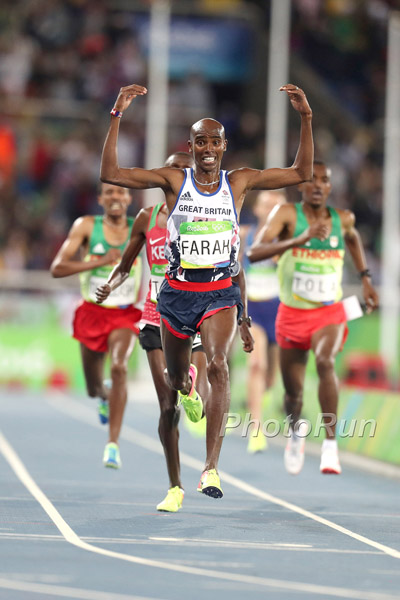
Mo Farah gewann in Rio seine dritte olympische Goldmedaille. ©Victah Sailer
Olympia Rio 2016 aktuell II: Mo Farah verteidigt 10.000-m-Gold trotz Sturz
Mo Farah hat zum zweiten Mal in Folge die olympische Goldmedaille über 10.000 m gewonnen. Der Brite zeigte bei den Olympischen Spielen in Rio einmal mehr, dass er zurzeit der weltweit beste Langstreckenläufer auf der Bahn ist.
Selbst ein Sturz konnte den 33-jährigen Londoner, der als Kind aus Somalia nach Großbritannien gekommen war, nicht aufhalten.
Mo Farah gewann das Rennen nach einem spannenden Schlussspurt in 27:05,17 Minuten vor Paul Tanui (Kenia/27:05,64) und Tamirat Tola (Äthiopien/27:06,26).
Auf den nächsten Plätzen folgten der Äthiopier Yigrem Demelash (27:06,27), der Bronze haarscharf verpasste, und Mo Farahs Trainingspartner Galen Rupp (USA/27:08,92).
Mo Farah schrieb mit seinem Sieg ein Stück olympische Leichtathletik-Geschichte.
Er ist der fünfte Athlet in der Geschichte der Spiele, dem über 10.000 m eine Titelverteidigung gelang. Farah steht jetzt in einer Reihe mit den Laufsport-Legenden Emil Zatopek (Tschechoslowakei/1948 und 1952), Lasse Viren (Finnland/1972 und 1976), Haile Gebrselassie (1996 und 2000) sowie Kenenisa Bekele (beide Äthiopien/2004 und 2008).
Am kommenden Sonnabend könnte er ein weiteres Stück Leichtathletik-Geschichte schreiben, sofern ihm auch über 5.000 m die Titelverteidigung gelingt. Zwei Doppelsiege in Folge bei Olympia über die Bahn-Langstrecken gab es bislang erst einmal: Lasse Viren schaffte dies 1972 in München und vier Jahre später in Montreal.
Mit drei Goldmedaillen wurde Mo Farah schon jetzt zum erfolgreichsten britischen Leichtathleten der olympischen Geschichte.
Im Finale hielt sich Mo Farah anfangs zurück und sortierte sich, wie schon bei großen Rennen in den vergangenen Jahren, zunächst ganz am Ende des Feldes ein. Nach rund 2.000 Metern schob er sich immer weiter nach vorne, übernahm kurzzeitig die Führung und überließ dann jedoch anderen die Führungsarbeit. Es schien, als hätte Mo Farah alles unter Kontrolle, doch ausgerechnet sein Trainingspartner Galen Rupp trat dem Olympiasieger nach gut 4.000 Metern versehentlich in den Hacken und brachte ihn zu Fall.
Blitzschnell war Mo Farah jedoch wieder auf den Beinen und lief weiter. „In einem Moment kann alles vorbei sein“, kommentierte der Brite später seinen Sturz und erklärte: „Ich habe so viel investiert für Olympia, ich konnte mir das nicht nehmen lassen. Deswegen sagte ich mir, ich muss so schnell es geht wieder aufstehen und weiter rennen.“
Als die Kenianer nach einer 5.000-m-Durchgangszeit von 13:53 Minuten das Tempo immer wieder forcierten, war Farah längst wieder vorne dabei. Sein vermeintlich schärfster Konkurrent, der Kenianer Geoffrey Kamworor, bekam in der Schlussphase des Rennens Probleme und wurde am Ende nur Elfter.
Dafür forderte ein anderer Kenianer Mo Farah heraus: Paul Tanui überholte Mo Farah rund 300 Meter vor Schluss und zeigte ebenfalls starke Spurtstärke, doch eingangs der Zielgeraden nahm Farah dem Kenianer die Führung wieder ab und stürmte ins Ziel.
„Es war ein sehr emotionaler Sieg für mich“, sagte Mo Farah, der nun am Mittwoch bei den 5.000-m-Vorläufen seine zweite Titelverteidigung beginnen wird.
race-news-service.com
13 AUG 2016 21:27 Please click on a row below to view more information
| POS | BIB | ATHLETE | COUNTRY | MARK | |
|---|---|---|---|---|---|
| 1 | 2452 | Mohamed Farah |  GBR GBR |
27:05.17 | |
| 2 | 2698 | Paul Kipngetich Tanui |  KEN KEN |
27:05.64 | SB |
| 3 | 2400 | Tamirat Tola |  ETH ETH |
27:06.26 | |
| 4 | 2392 | Yigrem Demelash |  ETH ETH |
27:06.27 | |
| 5 | 3097 | Galen Rupp |  USA USA |
27:08.92 | SB |
| 6 | 3015 | Joshua Kiprui Cheptegei |  UGA UGA |
27:10.06 | PB |
| 7 | 2691 | Bedan Karoki Muchiri |  KEN KEN |
27:22.93 | |
| 8 | 2344 | Zersenay Tadese |  ERI ERI |
27:23.86 | |
| 9 | 2337 | Nguse Amlosom |  ERI ERI |
27:30.79 | SB |
| 10 | 2166 | Abraham Naibei Cheroben |  BRN BRN |
27:31.86 | PB |
| 11 | 2677 | Geoffrey Kipsang Kamworor |  KEN KEN |
27:31.94 |
Statistics by Ken Nakamura
<
 EN
EN